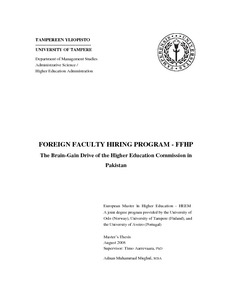Foreign Faculty Hiring Program - FFHP: The Brain-Gain Drive of the Higher Education Commission in Pakistan
MUGHUL, ADNAN (2008)
MUGHUL, ADNAN
2008
Hallintotiede - Administrative Science
Kauppa- ja hallintotieteiden tiedekunta - Faculty of Economics and Administration
This publication is copyrighted. You may download, display and print it for Your own personal use. Commercial use is prohibited.
Hyväksymispäivämäärä
2008-10-31
Julkaisun pysyvä osoite on
https://urn.fi/urn:nbn:fi:uta-1-19432
https://urn.fi/urn:nbn:fi:uta-1-19432
Tiivistelmä
This thesis explores the strengths and weaknesses of the Foreign Faculty Hiring Program (FFHP) in Pakistan from the ‘participant’s perspective’. The purpose of this research was to disclose the prime interest of foreign faculty members in joining the FFHP in order to gain a deeper knowledge and understanding about their experiences during their current tenure. In addition, the aim was to determine how important role FFHP has played so far in reversing the brain-drain into brain-gain. Apart from this, the argument of this study was to reveal the fact that foreign faculty hiring does not appear to represent something unique. To support this argument the researcher presented a contextual framework based on Indian Muslim education system during the British rule in the 19th century India and described the pre-partition situation of higher education. Similarly, the post-partition history of higher education in Pakistan was also discussed to highlight the efforts of the Higher Education Commission (HEC) in Pakistan since 2000. The researcher has described the reform and expansion movement of HEC especially in the era of globalization and internationalization. To investigate issues related to this work, the researcher adopted a qualitative case study methodology incorporating some quantitative techniques. The data collection methods used in this research included documents (such as: historical texts, publications, government documents, official reports, online papers, etc.) and web self-administered questionnaire.
The Web-SAQ, consisting of 30 questions, was sent to foreign faculty members who joined the FFHP since 2004 onwards. From a total of 145 recipients, 43 male and female returned the online-questionnaire making an average of 30% response rate. The mean age of the participants, who represented 12 different countries and 5 continents of the world, was 53.20 years. The researcher examined and analyzed the data utilizing the “mixed methods approach” by using two different techniques: (1) basic descriptive statistics through reporting of percentages and mean responses of foreign faculty via SurveyGizmo, and (2) qualitative content analysis of open-ended responses. Data from this research confirms that almost 100% of respondents wanted to contribute in reversing the brain-drain and their overall satisfaction level towards FFHP was high. However, findings also indicate that foreign faculty members have experienced a variety of challenges and problems in terms of university politics and bureaucratic regulatory structure and as such have a great deal to cope with from an emotional point of view. Finally, the study reveals that foreign faculty members are not highly valued in Pakistan by their local counterparts. To address all such issues, the researcher has made some recommendations and well grounded suggestions which may be of interest to general readers as well as Higher Education researchers for further study.
Key words: Higher Education, Foreign Faculty, Internationalization, Brain-Drain/Gain
The Web-SAQ, consisting of 30 questions, was sent to foreign faculty members who joined the FFHP since 2004 onwards. From a total of 145 recipients, 43 male and female returned the online-questionnaire making an average of 30% response rate. The mean age of the participants, who represented 12 different countries and 5 continents of the world, was 53.20 years. The researcher examined and analyzed the data utilizing the “mixed methods approach” by using two different techniques: (1) basic descriptive statistics through reporting of percentages and mean responses of foreign faculty via SurveyGizmo, and (2) qualitative content analysis of open-ended responses. Data from this research confirms that almost 100% of respondents wanted to contribute in reversing the brain-drain and their overall satisfaction level towards FFHP was high. However, findings also indicate that foreign faculty members have experienced a variety of challenges and problems in terms of university politics and bureaucratic regulatory structure and as such have a great deal to cope with from an emotional point of view. Finally, the study reveals that foreign faculty members are not highly valued in Pakistan by their local counterparts. To address all such issues, the researcher has made some recommendations and well grounded suggestions which may be of interest to general readers as well as Higher Education researchers for further study.
Key words: Higher Education, Foreign Faculty, Internationalization, Brain-Drain/Gain
